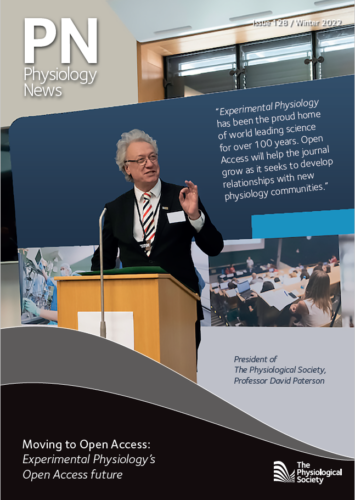
Physiology News Magazine
Claude Bernard, playwright, and the value of the dramatic arts for physiology education
Collection of education-themed articles from Europhysiology 2022 conference
News and Views
Claude Bernard, playwright, and the value of the dramatic arts for physiology education
Collection of education-themed articles from Europhysiology 2022 conference
News and Views
https://doi.org/10.36866/pn.128.15
Dr Paul Murphy
Queen’s University Belfast, UK
The young Claude Bernard, bored with life as a pharmacist’s assistant in Lyon, France spent his free time watching plays at the Théâtre des Célestins, and was inspired to write a vaudeville comedy “La Rose du Rhône”, which was performed to some acclaim but never published (Foster, 1899, p.7). Following his first theatrical success Bernard wrote a more ambitious historical play in five acts, initially framed as a tragedy but later changed into a prose drama. With play in hand he travelled to Paris to make his fortune where he was received by the eminent scholar Saint-Marc Girardin at the Sorbonne. Girardin noted that the play, Arthur de Bretagne, possessed real artistic merit but rather than encouraging Bernard to continue as a playwright he suggested that he pursue a career in medicine and write plays in his spare time: “‘You have studied pharmacy’, said he, ‘study medicine, you will thereby much more surely gain a livelihood'” (Foster, 1899, p.9). And so the world lost a promising playwright but gained a physiologist who became a titan of medical science.
Mise-en-scène
Bernard famously developed the concept of milieu intérieur to describe the extracellular fluid forming the environment of cells in a multicellular organism. Milieu intérieur or the internal environment cannot be fully understood or meaningfully separated from milieu extérieur or the external environment. For example, a human being has to breathe in air, which is processed by the lungs and oxygen is then distributed to the bloodstream. The field of epigenetics focuses on how an individual’s behaviours and interaction with their environment can lead to changes that affect the way their genes function.
The consumption of food, the transfer of knowledge in the process of communication and every other aspect of human behaviour involves the social interaction between an individual and their environment. Indeed, all scientific knowledge is an outcome of the social interaction between individuals. In stagecraft the technical term for external environment, as Bernard knew well, is mise-en-scène or the stage setting, and the scenery and properties of a stage production. The technical term for the interaction between individuals on stage is drama, from the Greek noun δρᾶμα meaning deed, or action, derived from the verb δρᾶν meaning to do, act, or perform (OED online).
Delivering a winning performance
Simulation-based education (SBE) (Nestel et al., 2018) is traditionally manikin-centred but there has been movement in recent years towards a more person-centred emphasis, particularly regarding the involvement of simulated patients (SPs) (Nestel and Bearman, 2015) who perform the role of the patient in training sessions. The kind of training SPs receive varies widely depending on the country and institution in which they work.
Over much of the last decade I have designed and delivered SBE with staff in social work, and healthcare disciplines including medicine, nursing, midwifery, psychology, psychiatry and most recently physiology, and pharmacy. The collaborative education often involves drama students performing as SPs, and a common finding that emerges from both staff and student feedback is that the drama students provide high-fidelity performances that are comparable and often indistinguishable from real patients (Walsh and Murphy, 2017).
The power of role play
Person-centred engagement is often consigned to communications courses, which make up a small percentage of the curricula of most healthcare disciplines. The overwhelming focus is on teaching students subject-specific technical knowledge and skills, with the content in communications courses often referred to as non-technical skills. The deficit model description of communication skills as non-technical is problematic and leads to the derogation of skills, which are nonetheless essential to effective healthcare (Murphy et al., 2019).
In a recent collaborative educational initiative I worked with colleagues in the physiology education team at Queen’s University Belfast to address this issue focusing on a case centred around a 34-year-old woman experiencing idiopathic premature menopause. The role of the woman was performed by drama students and the role of the doctor was performed by second-year medical students. The aim was to take physiology education off the page and onto the veritable stage where students interacted in a live, high-fidelity SBE scenario.
Why healthcare should embrace the arts
In the feedback questionnaire the medical students reported that the live simulation really contextualised physiology, and that they found the experience challenging, engaging, and authentic, and more realistic than family placement or a very scripted OSCE examination. The drama students found the simulation worthwhile in contributing to the education of medical students as future healthcare professionals, and gained value from acting in a situation that very few students of the dramatic arts have the opportunity to experience. The takeaway for physiologists and healthcare educators more generally is to imagine an alternative reality where Claude Bernard, rather than abandoning the dramatic arts for medical science, sought to combine them in order to enliven and enhance physiology education.
References
Foster M (1899). Claude Bernard. Cambridge: T. Fisher Unwin.
Murphy P, Nestel D, Gormley GJ (2019). Words matter: towards a new lexicon for ‘nontechnical skills’ training. Advances in Simulation, 4(8). https://doi.org/10.1186/s41077-019-0098-5
Nestel D, Bearman M (2015). Simulated patient methodology: theory, evidence and practice. Chichester: Wiley Blackwell (eds.).
Nestel D et al. (2018). Healthcare simulation education: evidence, theory and practice. Chichester: John Wiley & Sons, Ltd. (eds.)
Oxford English Dictionary online. Available at: https://www.oed.com/. Accessed 10 Sep 2022.
Walsh I, Murphy P (2017). Healtheatre: Drama and Medicine in Concert, Healthcare, 5,37.
